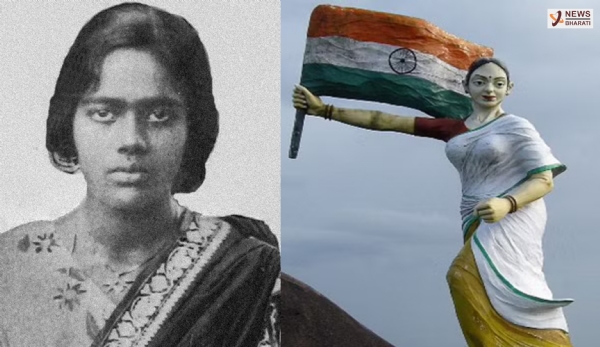Kanaklata Barua - Unsung Hero of Indian Freedom Struggle from Assam
When we talk about the Quit India movement of 1942, one never crosses into the immediate North Eastern state of Assam , even in our mind. So was the Indian Freedom Struggle restricted to the plains? What about the North East? Were they or were they not fighting for India"s freedom?
Total Views |
Will we be able to sacrifice our life, at a young age of 18, for the purpose of freeing our motherland from the clutches of an oppressive foreign rule? Here's a tale of brave Kanaklata Barua from today's Assam who sacrificed her life for motherland Bharat, on today's date, in 1942.

When we talk about the Quit India movement of 1942, one never crosses into the immediate North Eastern state of Assam , even in our mind. So was the Indian Freedom Struggle restricted to the plains and had an influence further in the South? What about the North East? Were they or were they not fighting for India's freedom? Bursting that bubble for you right away, the Indian freedom struggle was as much fought in the Himalayan foothills of the North East, as much they were fought in the Indian plains.
““A young girl who was just 18 years old, sacrificed her entire life for her motherland, with a little moment of bullets fired by the British piercing her body to death was an impactful lesson for the nervous youth of the country who was then still thinking of whether or not to join the freedom movement.” ”
Indian history is filled with chapters of bravery from across the horizons of the country. Indians have fought their battle for freedom vigorously, beyond the divides of geography, caste, religion and literally everything that exists, merely with the single aim of getting rid of the oppressive British rule.
Kanaklata Barua who was born in Barangabari, Assam in 1924 was associated with a group of freedom fighters called the Mrityu Bahini. Pushpalata Das, comparatively a renowned name of the Indian freedom struggle, was her good friend and one of the reasons how Barua had joined Mrityu Bahini, an organization formed to assist the national freedom struggle on regional level.
On Sept 20, 1942, a group representing the Mrityu Bahini, that included both Pushpalata Das and Kanaklata Barua, marched towards Gohpur Police station to hoist the Indian Tricolour and show support to the Quit India Movement led by Mahatma Gandhi. However, to bring down Mrityu Bahini's movement, the British Police forces were ordered to open indiscriminate fire on the group.
In the open fire fired by the police, 18 year old young Kanaklata was one of the many people who lost their lives. Luckily for herself, Kanaklata Barua died the death she would have really wished for. She became a national martyr of India who breathed her last breathe with the Indian Tricolour in her hand. “A young girl who was just 18 years old, sacrificed her entire life for her motherland, with a little moment of bullets fired by the British piercing her body to death was an impactful lesson for the nervous youth of the country who was then still thinking of whether or not to join the freedom movement.”
The freedom movement that our academics cover is somewhat an incomplete picture of the struggle. In fact, there are several little gestures of sacrifice that have taken place and including all those in the academics is practically impossible. Besides, to include them even suffice knowledge isn't available. We have been learning Indian History with a colonized mindset, even today, 75 years after independence. Once we get rid of the mindset is only when we will be able to understand and respect our true roots.
Of course, the armed forces never fail to respectfully remember our freedom heroes. In Sept 2020, the Indian Coast Guard commissioned a Fast Patrol Vessel (FPV) at the Garden Reach Shipbuilders and Engineers (GRSE) Ltd, which was named as 'ICGS 'Kanaklata Barua' in honour of the martyred freedom fighter.
India's fragmented history needs to be stitched together. And there were several Kanaklata Barua across the lengths and breathes of India, in fact from the land that is not even India's part today, who fought bravely and some even sacrificed their lives for India's freedom. Undoubtedly India is a free and independent nation today. But what about decolonizing the country? Only when we will try to know and understand such stories like that Kanaklata Barua, we will be decolonized as a society.


